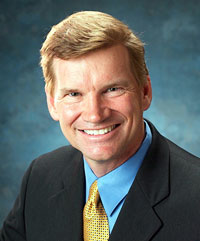 As I’ve run up and down the infobaun over the last week, I couldn’t miss all the talk of Ted Haggard. Here’s what some of those whom I frequent in cyberspace are saying about it all:
As I’ve run up and down the infobaun over the last week, I couldn’t miss all the talk of Ted Haggard. Here’s what some of those whom I frequent in cyberspace are saying about it all:Christianity Today has a special section devoted to the topic, on which is a link to Leadership editor-at-large George McDonald reflections on Out of Ur, who includes some interesting insights and cautions when it comes to leadership in “outsized” organizations.
Scot McKnight writes about Ted Haggard and the Evangelical Environment, calling first for forgiveness and grace and then issuing a challenge to find out what we can learn from “yet another moral collapse of an evangelical leader”—which involves examining the kind of environment we create as evangelicals and a call to “work hard at creating an environment of honesty. It is dishonest to the human condition to pretend that Christians don’t sin; but as long as we are afraid to confess to one another we will continue to create an unrealistic and hypocritical environment.”
Mars Hill pastor Mark Driscoll weighs in here (which includes his advice to pastors who travel as well as his, um, let’s just say now-well-circulated-thoughts about pastor’s wives who “really let themselves go”) and here. GetReligion has a plethora of posts on this topic, including here, here, here, here, here and here. Andrew Jones (aka Tall Skinny Kiwi) posted numerous times here (with some info on Leith Anderson, Haggard’s NAE replacement), here, here, here (where he dovetails on Driscoll’s advice to those on the road) and here (with a load of links).
One of my favorite bloggers has also weighed in: Leighton at TheHeresy explores the gamut of reactions he had, including one labeled “Frustrated.” Why? Read on:
Because there are some that seem to think that if Haggard believed more like them this wouldn't happen. The critical mistake we make in our thinking at a global and local level is believing that our old answers still work. We keep coming back to flawed assumptions. There are lots of reformed churches that take theology very seriously and lots of fundamentalist churches that believe very strongly in obeying the word of God, there are lot of pentecostal/charismatic churches getting people filled with the Spirit, but collectively they make almost no net impact on the behavior of evangelicals as a whole.I really resonate with this. Haggard’s story is a chance for us to re-examine how we live together as believers, how we do this thing we call “church,” and if in it all we are focusing more on our structures, institutions, doctrine, theology or whatever else it is we’re turning to instead of Jesus. Following Jesus isn’t about believing the right thing or doing things the right way: it’s about learning to ever-more-deeply live with and in him. It’s about a relationship, one of trust and surrender and love. Everything comes from that.
Maybe it is time for us to humbly admit that we are missing something. My guess is we are missing Jesus. We equate Jesus with the values and morals of the Christian subculture, or vigorous theology, or spiritual experiences. Perhaps we can do all these things without knowing Jesus at all. Maybe we've been going through the motions for so long we don't know what is real anymore. Maybe we don't really want to know Jesus because the cost is too high.
 As for me, I’ve spoken on this subject of sin and grace before and my thoughts haven’t changed. Haggard deserves to be treated the same way we treat each other (or at least, the way Jesus calls us to treat each other). We love, extend grace, and forgive because that is what God did and does for us. Because that is who God is—and his Spirit lives in us. Because that is the way you live in the Kingdom. Because that is who we are.
As for me, I’ve spoken on this subject of sin and grace before and my thoughts haven’t changed. Haggard deserves to be treated the same way we treat each other (or at least, the way Jesus calls us to treat each other). We love, extend grace, and forgive because that is what God did and does for us. Because that is who God is—and his Spirit lives in us. Because that is the way you live in the Kingdom. Because that is who we are.That doesn’t discount sin. God hates sin. Sin hurts us and those around us. But God’s also provided an antidote to sin: Jesus and Life. My prayer echoes many of those I’ve linked to here: O Lord, may Haggard and his family experience the transforming grace of our always-loving and already-forgiving God. And may your children around him spill that love and grace upon him.
(Image: Haggard, Wikipedia; hand and water, Oi Jimmy! at flickr.com)